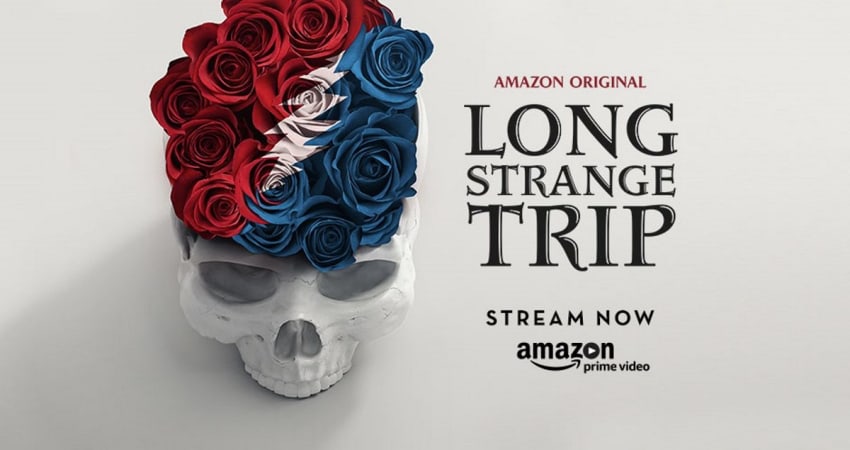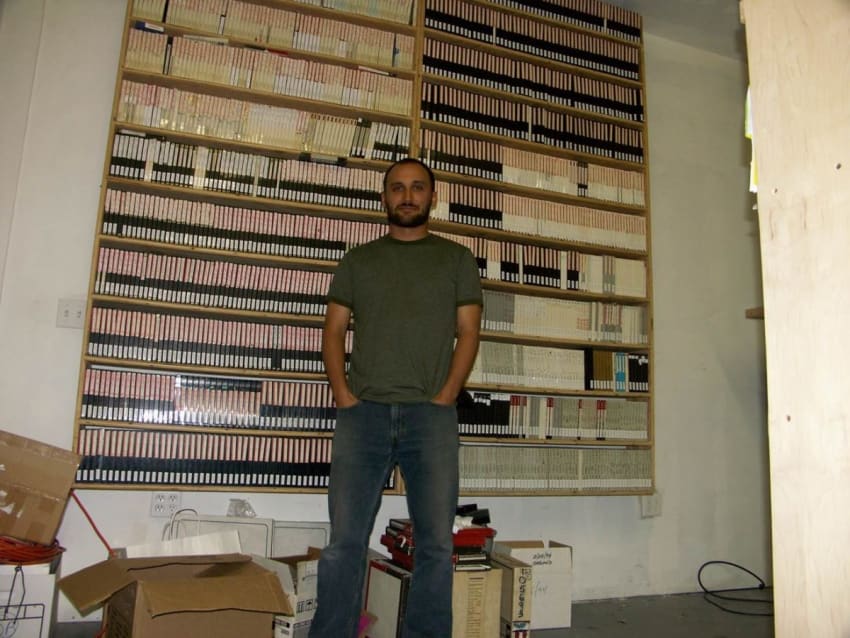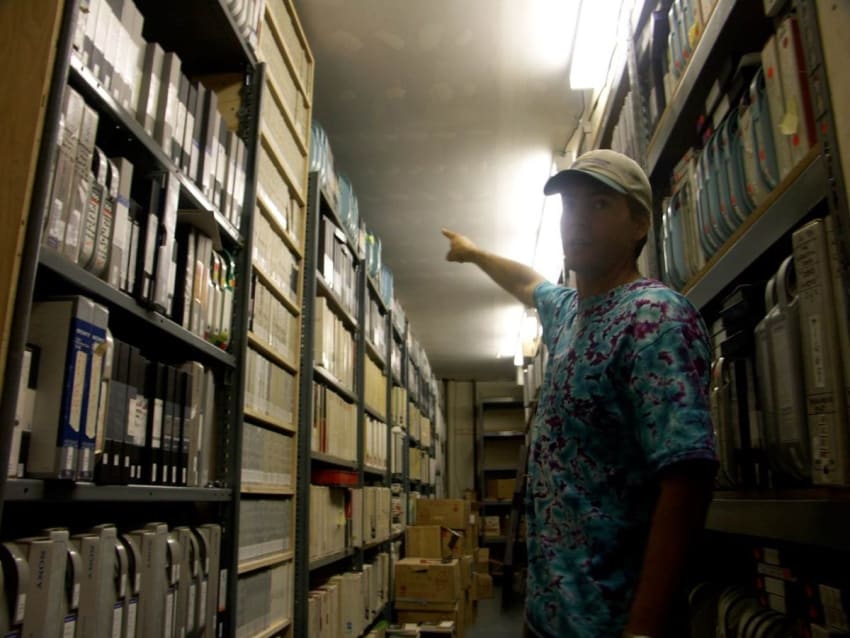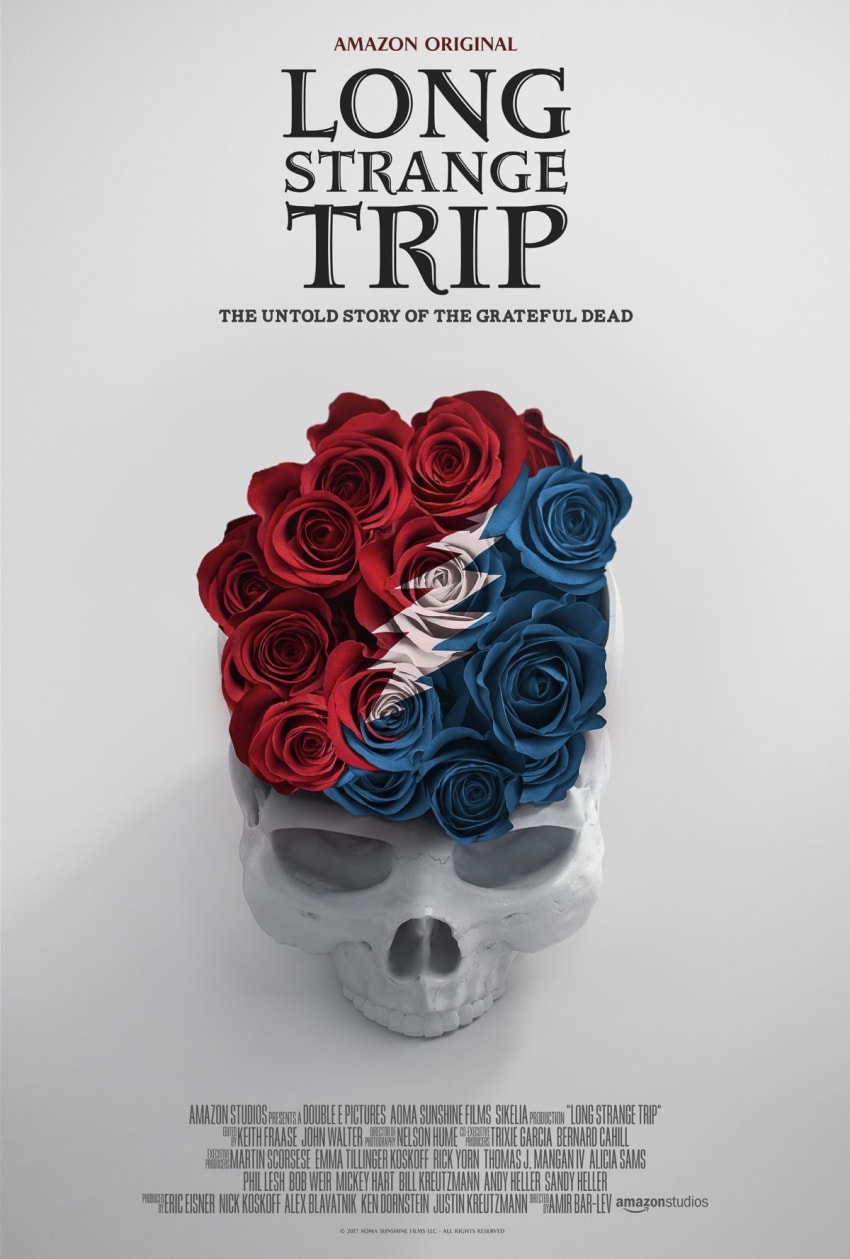A Typical Daydream: Director Amir Bar-Lev Discusses ‘Long Strange Trip’ Grateful Dead Documentary
By Ryan Dembinsky Jun 2, 2017 • 9:01 am PDT

Words by: Ryan Dembinsky
With the recent revitalization of the Grateful Dead as a next generation cultural phenomenon amid momentous milestones like the Fare Thee Well 50th anniversary shows, the expansive Day Of The Dead tribute, the inception of a stadium touring iteration of founding members as Dead & Company, and the ongoing success of Dark Star Orchestra and Joe Russo’s Almost Dead, the Grateful Dead is perhaps more culturally relevant today than at any other point since Jerry Garcia’s passing in 1995.
Despite those other massively successful endeavors, one modern project could perhaps serve as the most enduring contribution to the Grateful Dead cannon: director Amir Bar-Lev’s career-spanning documentary on the band Long Strange Trip.
For a band with some of the most devout fans and historians of any art form anywhere, there has never been a definitive documentary on the Grateful Dead. There certainly exists a wealth of in-depth books on the band – both biographical and autobiographical – as well as a host of tremendous concert films, but the definitive documentary has remained elusive, until now.
At three hours and 58 minutes, the film stretches across six acts and provides a wealth of unseen footage and insight for hardcore Deadheads. while telling a compelling story for both fans and newcomers alike. But in a lot of ways it only scratches the surface.
The movie doesn’t set out to satisfy only diehards, nor does it dumb the content down for the uninitiated. Rather, it walks a balance beam to meet the needs of both camps. You get a captivating backstory of the band loaded with essential unseen footage, particularly of Jerry’s early childhood. You get a cross section of tertiary characters within the organization. You get the obligatory segment on Deadheads. And you get ample attention paid to hardship and loss that followed the band and loomed in the shadows around every corner.
What you don’t get in four hours is an appearance from every key character on the scene, a heavy emphasis on the various eras from a musical perspective (sorry, no hour-long segment on May ’77) or a lot of time devoted to live performances of the band on stage. As Bar-Lev describes in the forthcoming chat which took place by the fireplace at the Marlton Hotel on 8th Street in Greenwich Village, a documentary film is not the place for a Wikipedia entry.
This is a story first and foremost, and it is meant to cater as much to new fans as it is to Deadheads. Bar-Lev does not let the Deadheads down, but managing the balance requires a careful tightrope act. What sticks out most is the filmmaker’s courage to go deep into the drugs that led to the ultimate demise of Jerry Garcia. The movie is uplifting in many ways, but it is also deeply sad: balanced. Long Strange Trip is now part of the Grateful Dead cannon. Everyone who watches the film will find things they love as well as things they might like to see differently, but the four-hour film is nuanced in a way that reveals new depth and layers to peel back with each subsequent viewing.
The four hours pass as easy as breathing. Thirteen years in the making, Long Strange Trip comes out today on Amazon Prime. Here’s Amir.

JamBase: I thought we could start out very generally, going back to your formative period during your middle school and high school years when you were sort of deciding what you thought was cool in the world. Could you describe yourself during that time and what led you into arts and these kind of off-the-beaten-path type of things like documentary films and the Grateful Dead?
Amir Bar-Lev: It’s funny – I went to go see Roger Waters last night, who I love. But when the guitar player played all his guitar solos they sounded exactly like they did on the albums. On some level that was nice, but on a more fundamental level it kind of sucked. It felt contrived. When I discovered the Grateful Dead as a teenager, they kind of ruined other bands for me, because everything else feels theatrical after you’ve seen great musicians improvising and composing music, live, on stage. The Dead had the ability to focus the audience’s attention on music making rather than show business.
JamBase: Were you always interested in creative outlets and looking for things outside the mainstream in terms of music, as well as the path that led you into filmmaking?
Amir Bar-Lev: Interestingly enough, I got to filmmaking via liquid light shows [laughs]. I started off doing light shows for raves and bands and I had a pretty fun multi-projector setup. I worked with Bill Graham Presents’ light show team a bit and with this great old light show artist Walter in the Hog Farm. Finally, I had this one big break, where I saw that some guys were doing a light show for a New Year’s Run for the Grateful Dead and I walked up to them and told them about these polarizing acetate slides that I had been working with. It just so happened that had recently been talking about that same kind of slide, and they said “Yeah, bring it by tomorrow!” So, I got to have a few nights of doing lights for the Grateful Dead. Totally randomly. It was doing light shows that led me to editing, and eventually to directing.
JamBase: So, this scene was obviously a big thing growing up. What’s your live show experience: in the hundreds? 50? Or a few here and there?
Amir Bar-Lev: You know, this sounds kind of a dickey thing to say but I’m getting a bit tired of talking about how many shows I’ve been to! I think the whole jam band world is too status conscious. We shouldn’t be asking each other about how many shows we have seen unless it’s really germane. I’m happy to discuss the film and my thinking behind it and the underpinnings of it, but who really cares how many shows I’ve seen? I’m not in the film. Why do we always talk about that?
JamBase: It’s funny, this isn’t the first time I’ve heard this in a Dead related interview. Bill Walton kept chewing me out for a similar thing. He kept saying, “There you go again trying to rate and rank everything.” I guess for people like me who grew up with jam bands around the same time as the internet really coming about, our age group wants to know all the stats. We want to know the best versions of everything and we want to know about all the best shows. I think it helps focus your attention on the listening.
But I agree with you on the status thing. I was mainly asking you that to get some context of how deep in the weeds we could go with this interview. I always thought that was stupid though and basically a way for a bunch of nerds to put themselves on a pedestal in this arbitrary hierarchy.
Amir Bar-Lev: [laughs] Yeah, I’m with Bill on this matter. The ratings and the rankings are anathema to what our whole scene should be about, because with live music, the whole point of it is getting as close to being in the now as we possibly can. So, when people start to advertise how many shows they have been to, it becomes a way of one-upping each other — it’s hierarchical. It should be illegal to ask another Deadhead how many Dead shows they have been to.
JamBase: Moving on to the film, it has been a ridiculous amount of time since you dreamt up this brainchild – like 13 or 14 years now – what were some of the most challenging obstacles to overcome? I think we all know that there are some big personalities involved when working with the extended Grateful Dead organization, as seen in the movie. Were there any panic moments when you thought it might not happen?
Amir Bar-Lev: Oh my god, yes. I can tell you they were more grief moments than panic moments. There were certainly panic moments as well, but then there were certain times that felt like it was resolved. I would come up empty-handed. I remember clearly several times that we felt like it was dead, so much so that I did in fact did move on to other films.
JamBase: Can you say what were some of the specific things that seemed to derail the project?
Amir Bar-Lev: The Grateful Dead have a built-in inertia about them, where if one person has a misgiving about a project, it’s not going to go anywhere. There was always somebody who had a problem with the idea of a film, or me, or had some friend that they wanted to get to direct the film. I used to describe it as a game of chutes and ladders. You’d get so close and then whoosh, you’re right back at the beginning.
Our real challenge with the film, though, is that the Grateful Dead, and music in general, is experiential. It would be akin to making a film about a comedian. If the film itself isn’t funny, then nobody is going to understand the subject matter. If you’re making a film about sex and it’s not sexy, then you missed the mark. So, we tried to make a film that was in itself musical. The formal approach had to have some of the qualities of the Grateful Dead. It had to feel holistic – where every particular thing is connected to everything else. There are certain moments in the film that, when they happen, make sense at face value, but they don’t make sense on a secondary level until you get to a later place in the film. It’s kind of psychedelic that way. What’s that Blackalicious line? “Everything we learn we’re just remembering.”
JamBase: Once you got permission, I assume you had more or less free reign over the band’s archive. That sounds like a lot of fun. I’m envisioning you spending a lot of days grabbing a six pack just hanging out with all these amazing photos and old video footage. Could describe the process of digging through the material and figuring out what was a gem and what was well-worn material that people had seen a lot before or that didn’t really add to the story?

Amir Bar-Lev: [laughs] It was a lot of fun, but I didn’t really get to spend a lot of time in the vault. I got to go into the vault once many years ago when I first set out on this journey. I took a couple pictures with my favorite shows and stuff like that, so that was fun. It was me and David Lemieux and it was around year three of the journey. I can dig up those photos for you guys if you’d like to include one? Anyway, when I first met David, he took me to the vault, but by now the vault has moved and has been incorporated into something in Burbank, so for the film we mostly just got palettes of material sent to us. When you have that much archival material, the danger is that you will miss something right under your nose. We must have had at least a year of solid footage. We created a workflow, whereby we had a group of people who transcribed every interview that we got, which was an incredible amount of work, but it meant we could search through everything they ever said on the recordings. So, if I wanted to find the word “Watts,” for example, I could search and find it anytime Jerry ever said it. That is an incredible asset.
JamBase: Grateful Dead big data [laughs].
Amir Bar-Lev: [laughs] That’s exactly right, it’s big data. That’s good, I’m going to use that.
JamBase: In telling this story, there are a lot of decisions to make in terms of how you want to approach it. The first one that struck my mind is how to tackle the music, meaning how much time should be spent letting the viewers just listen to the band perform live versus treating the music more like a soundtrack to the story and then choosing between live versus studio material. I mean you have this massive treasure trove of recorded music between soundboards, audience recordings and studio albums. It sounded like at times you even used some audience recordings. How do you even begin to decide what to use with so much recorded music to choose from?
Amir Bar-Lev: The film hangs in the balance of the need to satisfy diehard fans on the one hand and newbies on the other. I didn’t want to bore the Deadheads, so one thing I did was try to give the fans one thing while giving the non-fans something different at the exact same time. That’s one of the reason we used the “stems” as often as we did. From the vault we got the multi-track isolated tracks, so when we’re in a song like “Truckin’” that everyone knows, we might only use the bass, the organ and the electric guitar. What this does is it renews the music for fans who have heard the song a million times, but they have never heard it stripped down like that.
JamBase: I would think probably the hardest decision to make given that it was your job to decide how you wanted to tell this story – and I don’t want to give too much away for people who haven’t seen it – is that you had to choose between making a feel-good story of one of America’s great party bands or a story of one of America’s great bands that perhaps partied too much. My personal experience was that I went out before seeing the film and had a few drinks and was expecting to have this fun night watching a Grateful Dead movie. But four hours later, I left feeling like, “Wow, that was an amazing documentary, but I also felt really sad in a lot of ways as they dealt with a massive amount of loss.” There is a terrible darkness surrounding Jerry at the end of his life even though he is so often viewed as this perpetually happy teddy bear in popular culture.
Amir Bar-Lev: The thing that was amazing about a Grateful Dead concert was that it traversed a wide range of emotions, so there would be “Sugar Magnolia” moments but there would also be “Wharf Rat” moments and the experience ran that gamut. I felt like the film needed to do the same thing. Anybody who feels that this is a tragic story is missing the great success that is the Grateful Dead, and anybody who thinks that the success is not without consequences is also missing a part of it.
One of my favorite lines in the film is when Nick Paumgarten says, “If you pay attention to the music, you get to know that Jerry Garcia brings dark news, and that is when you really start to take him seriously.” Most Deadheads will recognize that about Jerry even though over time he has been mythologized into a happy hippie Santa Claus. It’s true: he was hysterical. And he was fat [laughs]. But at the same time, he had a lot of shades of light and darkness in his art, and as far as I can tell, his personality, too.
JamBase: Tell me about the film’s title. It’s obviously a quintessential lyric for a spanning documentary like this, but was that your first choice? I’m guessing as a Deadhead you probably had a more obscure first choice?
Amir Bar-Lev: I always have trouble with titles because not being a marketing person, my titles are always obscure and weird. I fought tooth and nail to call the Tillman Story, I’m Pat Fucking Tillman, which were his last words, but basically, I was read the riot act and told that nobody would ever get to see the film because of FCC laws and stuff like that.
I’m not going to tell you what my early titles were for Long Strange Trip, but they were probably ridiculously obscure and most likely would have satisfied only me [laughs]. Working with Amazon, they probably correctly explained to me that my obscure titles wouldn’t do the trick for the kind of marketing that they wanted to do. I take that seriously because I feel that the Grateful Dead story is subversive, and I like the idea that this title is going to get splashed all over the place.
For example: it’s going to be playing at a bunch of international festivals soon. That wouldn’t happen but for the fact that people world-wide think of Jerry as Santa Claus and are familiar with “Truckin’.” But they are going to soon realize that there is a strong vein of anti-authoritarianism to this story. So, the very accessible title was all part of my Machiavellian scheme to corrupt youth internationally [laughs].
JamBase: In terms of the interviewees, I sensed you treated it more or less like a meritocracy based on who had good jokes and thoughtful lines. Some people might grumble that someone like Sam Cutler, for example, was not the longest standing member of the crew, but he was hilarious and some people might say Bill Walton should get the celebrity nod over Al Franken, but I thought Franken’s part was the funniest bit in the whole movie. How did you juggle the massive extended family of people that could have played a part in the story?
Amir Bar-Lev: You already know what my answer is going to be. There is a place in the world for Wikipedia entries, but a film is not that place. The two mediums have different requirements. If you are doing a Wikipedia entry or a history book, you’re going to cast it differently. If you’re doing a film, you must think about characters. It doesn’t matter for our film that Steve Parish is only one of many roadies or Sam Cutler was only with the band for four years. I stand by my casting, because, as you said, those guys are hilarious, and amazing screen stars.
JamBase: Finally, one part I thought was powerful towards the end of the film – and I don’t remember the exact quote – was when Phil says something to the effect of, “It’s not like we all didn’t try, we tried all the time,” when referring to Jerry’s spiral into heroin and their attempts at getting him off the road and hosting interventions. Knowing everything you know now about the band, do you think there was any way this story could have turned out different?
Amir Bar-Lev: That’s a good question. I think there is a mythic component to this story that involves destiny, as much as I hate to use that term. I didn’t know Jerry personally, so I think about these things differently than his friends and family might think about them, but from my perspective it doesn’t make sense to look at the Grateful Dead story with regrets and say, “It should have happened this way,” or, “It should have ended that way.” It happened exactly the way it happened.
I can say that when I got into the Grateful Dead as a teenager, a couple of years before “Touch Of Grey,” I was always naysaying the newbies. Which in retrospect was silly because I was one myself! Now, as a 45-year-old with a little bit of perspective I can look back and say that it was wrong to judge those people or that era. Even though at the time, it felt like an eco-disaster for the Grateful Dead, without it I probably wouldn’t have made my film, Chicago wouldn’t have happened,the Grateful Dead wouldn’t have the lasting relevance and cultural traction that it has today and you and I wouldn’t be sitting here together talking. So, I’m trying to apply judgement less in my life, and I think that holds true with what happened to Jerry and the Grateful Dead in the end.

